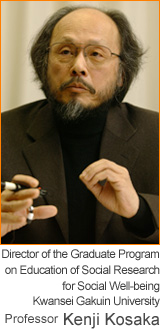
-
Background of the programWe, the Graduate School of Sociology, welcome graduate students with diverse backgrounds, academic or otherwise. Even students who have not studied sociology prior to entering the Graduate School can contribute to innovation in sociology by bringing diverse and novel ideas from their varied backgrounds into orthodox sociology. However, these students must then be trained in sociology, beginning with learning the basic material on sociological theories and methods, along with what we call socio-literacy.
-
What is Socio-literacy?What we have termed socio-literacy includes not only basic knowledge of sociological theories and methods but also a policy-oriented frame of mind that focuses on how these theories and methods can be applied to pressing problems in the contemporary world. Students who have developed socio-literacy become extremely sensitive to the social dilemmas of the world, such as poverty, economic disparity, social disconnection, war, prejudice, terrorism, and so on.
-
Social ResearchWe use the term social research in its broad sense, rather than implying specific methods or approaches to scientific inquiry. Our research program consists of three modules: (a) Theory and Formal Models, (b) Fieldwork and Qualitative Methods, and (c) Quantitative Research: Data Collection and Presentation. All graduate students in our department are trained in these three modules during the master’s degree program.
-
Career DevelopmentAfter finishing the master’s degree program, students may enter a range of occupations, working as researchers, journalists, NPO/NGO-oriented volunteers, or teachers at the junior- or senior-high school level, all with a socio-literacy mindset. Alternatively, they may continue their studies by entering the doctoral program, with the goal of becoming professional academicians, specializing in more specific topics within one or more of the three modules described above.
-
Optional Sub-programsWe provide a joint research program in which students implement research jointly with graduate students and academic advisors in other institutes and/or participate in joint seminars provided by multiple advisors from our own university and from other academic institutes. We also provide international programs that give students the opportunity to study abroad, join summer programs around the world, and participate in international workshops. Students are encouraged to write, discuss, and make their points in English, and we provide a special English program whereby they can improve their language abilities through language lessons and interaction with native English speakers. Those who continue their educational career through the doctoral program are strongly encouraged to complete their dissertations within the formally recommended program for writing dissertations and are provided with systematic support.
-
International TiesThrough the 21st Century Program 2003-2007, we have developed international institutional ties with equivalent research institutes around Asia, such as Tsinghua University and Beijing Normal University in China, Tribhuvan University in Nepal, the Social Science Academy in Vietnam, and others. We are planning a workshop on everyday life in East Asia, conducted for and by graduate students. A cooperative project with Beijing Normal University, the workshop is planned for around March 2009.
-
Social Research for Societal HappinessWith socio-literacy in mind, our research is research for humanity, not research for the sake of research. Thus, our studies will contribute to social well-being by fostering a world in which those with diverse cultural backgrounds can live peacefully together without social exclusion or prejudice.